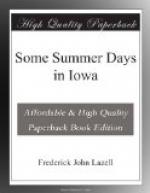The screechy orchestra is a poor substitute for the grand birds’ concerts of June and July. For the birds, August is a month of silence. Except for an occasional solo, nearly all the birds are silent, moulting and moping in the thickets. If you steal into the thicket you may find the thrushes and the thrashers feeding on the ground. Once in a while one of them shows himself in the morning or the evening, but not often. Nesting done, the brown thrasher ceased his long and brilliant solos from the treetops after the first week of July. Next week the catbird’s song was heard for the last time. Because the first nest of the wood thrush was robbed by the blue-jays, a second nest was built. This family was safely reared, and the wood thrush sang until the third week in July, when one clear sunset night, the sky all aglow with banners of golden red, he sang his farewell solo. For seven weeks the Maryland yellow throat sang just at the turn of the old woods road, where his mate had her nest in a low bush. As the babies waxed large his song waned, and he was not heard during the last week in July, nor since. Still the dickcissel, the lark sparrow and the indigo bunting continued their trio. Evidently their babies were somewhere over in the field nearby, a field that was corn last year, and now is grown up thickly with smartweed. August came with a rush of the mercury above the ninety mark, and there it has stayed. A week of it was enough for this trio. They ceased their concert work, but now and then the lark sparrow pipes up a feeble imitation of his sweet notes in July. Like the song sparrow, he cannot wholly refrain from expressing his satisfaction in being alive. Many men and women are just like that. The vireos also ceased singing at the end of the first week in August, but sometimes the red-eye gives a little preachment from his leafy pulpits in the woods. Latest among the singers are the chewinks, the wood pewees, the field sparrows, and, of course, the goldfinches and the cuckoos. The young chewinks left their nests in the pasture on the third, and the chewink’s feelings expressed themselves in song for two weeks after that. He out-sang the field sparrows, whose young were hatched August third, and left their nest on the twelfth. Apparently the field sparrow stopped singing and went to work providing for his family of three. But the chewink was not to be sobered so quickly. Why not sing with the work? The days are long enough, happy enough, for both. Even now he gives occasional bursts of song. Evidently this is the theory of the tanager also, for he sang all through July, and here in mid-August his trumpet tones occasionally ring through the leafy silences of the woods. The young wood pewees which left their nests on the eleventh are now able to shift for themselves; but the parents have much the same song as they had when the three eggs lay in the nest, saddled to the burr-oak bough. Still, through the peaceful morning air comes the loud, clear,




